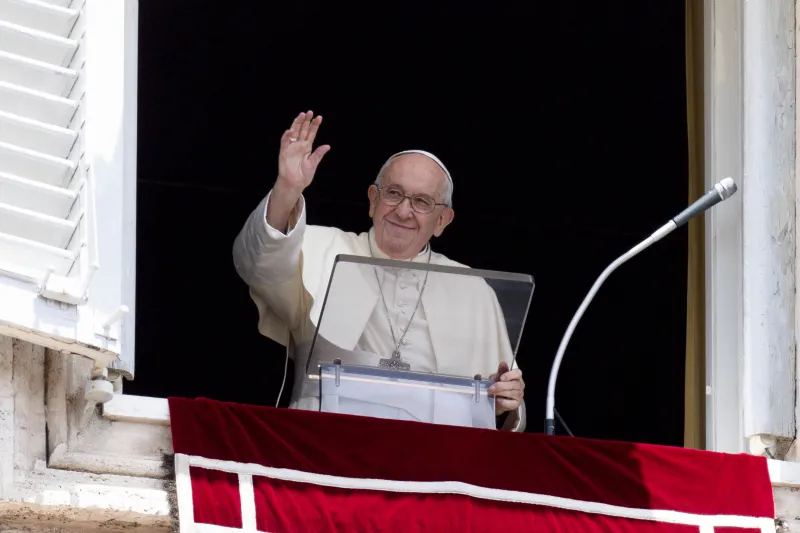
Vatican City, Jul 3, 2022 / 06:15 am (CNA).
Pope Francis said Sunday that evangelization should not be seen as “personal activism,” but a witness of love in relationship with others.
In his Angelus address on July 3, the pope posed a question: “How do we bring the good news of the Gospel to others?
“Do we do it with a fraternal spirit and style or in the manner of the world with prominence, competitiveness, and efficiency?” he asked.
Speaking from the window of the Apostolic Palace to pilgrims gathered in St. Peter’s Square, the pope encouraged Catholics to work in collaboration with “the witness of fraternity.”
“It is possible to develop perfect pastoral plans, implement well-made projects, organize down to the smallest details. You can summon crowds and have many means, but if there is no availability for one’s brothers and sisters, the evangelical mission does not advance,” the pope said.
Pope Francis reflected on how Jesus sent his disciples “two by two” in Sunday’s Gospel (Luke 10:1-9).
“The disciples were sent two by two, not individually. Going on a mission two by two, from a practical point of view, would seem to have more disadvantages than advantages. There is a risk that the two do not get along, that they have a different pace, that one gets tired or gets sick along the way, forcing the other to stop too. On the other hand, when you are alone, it seems that the journey becomes faster and smoother. However, Jesus does not think so: in front of him he does not send lonely people, but disciples who go two by two,” the pope said.
“Let us ask ourselves if we have the ability to collaborate, if we know how to make decisions together, sincerely respecting those around us and taking into account their point of view, if we do it in community, not alone. In fact, it is above all in this way that the life of the disciple reveals that of the Master, really announcing him to others,” he said.
After praying the Angelus with the crowd, Pope Francis prayed for peace in Ukraine.
“I appeal to the leaders of nations and international organizations to react to the tendency to accentuate conflict and confrontation,” he said.
The pope underlined that the world needs to move from focusing on political, economic, and military power strategies to a “global peace project,” which says “no to a world divided among conflicting powers” and “yes to a world united among peoples and civilizations that respect each other.”
He said: “The world needs peace — not a peace based on the balance of arms, on mutual fear. No, this will not do. This is turning history back seventy years.”
“The Ukrainian crisis should have been, but — if you want it to be — can still become a challenge for wise statesmen, capable of building in dialogue a better world for new generations. With God’s help, this is always possible!”
If you value the news and views Catholic World Report provides, please consider donating to support our efforts. Your contribution will help us continue to make CWR available to all readers worldwide for free, without a subscription. Thank you for your generosity!
Click here for more information on donating to CWR. Click here to sign up for our newsletter.






One may wonder who writes these words of wisdom and godliness!
He seems to prefer meet and greet or out and about. Would it not be better that he be in constant prayer for the flock and immersed in Holy Scripture to give wise counsel? This may seem overly bold, yet are we not to encourage and bear up our leaders?
1 Thessalonians 5:17 Pray without ceasing,
Philippians 4:6 Do not be anxious about anything, but in everything by prayer and supplication with thanksgiving let your requests be made known to God.
Ephesians 1:11 In him we have obtained an inheritance, having been predestined according to the purpose of him who works all things according to the counsel of his will,
Ephesians 1:3 Blessed be the God and Father of our Lord Jesus Christ, who has blessed us in Christ with every spiritual blessing in the heavenly places,
Galatians 6:16 And as for all who walk by this rule, peace and mercy be upon them, and upon the Israel of God.
Let us bless him with our prayers.
Implementing a real global peace project is the way forward. But peace based on the balance of arms, on mutual trembling and shivering in fear – is no peace.